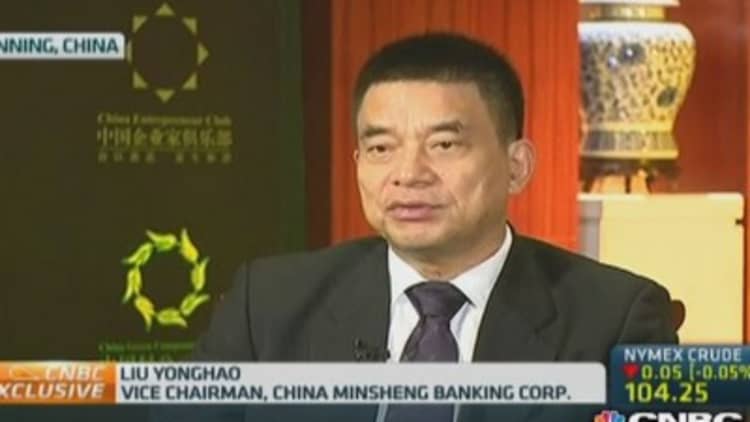
Shadow banking, among the biggest hurdles to restoring confidence in China's banking system, likely could be resolved by increasing the availability of loans for smaller businesses, the vice chairman of Minsheng Banking told CNBC.
"For these smaller businesses, they have a lot of financial demands in asking for loans. However, the banks cannot satisfy their demand. Therefore, this drives shadow banking," said Liu Yonghao, Minsheng Banking's vice chairman and holder of an around 7 percent stake in the bank.
Read More China's shadow banking shrinks amid delicate policy dance
"How can we help these smaller businesses so that they are able to make loans? How do we provide financial services for these smaller businesses through our financial and banking system," he said. "If we fix this, then we can fix shadow banking."
The size of China's shadow banking sector has stoked concerns over the stability of its financial system as it isn't clear how much of the debt can be repaid. Around $600 billion-$900 billion of trust loans are set to be rolled over this year.
Helping China's smaller enterprises may be a goal near to Liu's heart: Liu, a former teacher at a technical school, and his brothers started their entrepreneurial journey with around $150, which they've since turned into around $3.8 billion, according to Forbes.
Read More Do China's banks face a new headwind?
His bank is working to put its money where its mouth is. As China's first privately held bank, it focuses on private and smaller enterprises.
"We are one of the banks that offer the most loans for small businesses. Helping and providing services to these private and smaller enterprises is our purpose," he said. "We found opportunities despite that there are higher risks, greater pressure and more time spent on services. But as long as we do well then, we can get results," he said. "This is where the future is heading."
Read More China's debt problems are bad, but not Lehman bad
The bank reported 2013 net profit rose 12.6 percent to 42.28 billion yuan ($6.79 billion). By way of comparison, this is dwarfed by much larger state-controlled peer Industrial & Commercial Bank of China (ICBC) which reported 2013 net profit of 262.6 billion yuan, up 10 percent from a year earlier.
While many view China's nascent movement toward Internet financing as a huge potential competitor, Liu expects the development will be positive both for China's small businesses and the banking sector as a whole.
Read MoreChina banks strike back against threat from Internet finance
China's Internet giants, including Alibaba and Tencent, have entered the financing market, with Alibaba's Yue Bao quickly becoming the mainland's largest fund product earlier this year by offering rates much higher than the around 3 percent benchmark time-deposit rate at banks.
Since then, the state-owned banks reportedly have set limits on how much money their customers can transfer using mobile payment providers and on transfers into Yue Bao. Chinese regulators are also stepping up with new limits.
Read More China's shadow lenders: Here's how one is thriving
"Alibaba's Yue Bao is at the start of the financial services development and what they target are these smaller enterprises," Liu said. The higher returns from funds such as Yue Bao are spurring a shift in deposits away from the big banks, he said.
"The emergence of these internet banking entities is actually a boost for the bigger banks," he said. "It forces big banks to change and adapt to provide better services for citizens and private small enterprises. If you don't then internet banking entities will add on the competition and take away your customers."
—By CNBC.Com's Leslie Shaffer; Follow her on Twitter @LeslieShaffer1

